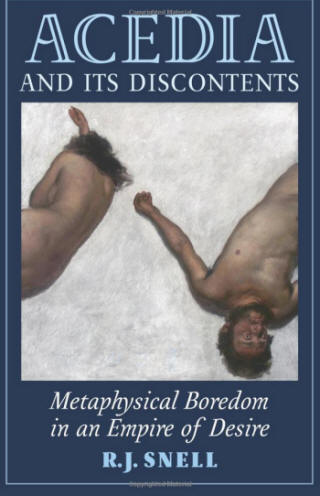Book Review
Acedia and its Discontents
R J Snell
Angelico Press
ISBN 978-1-62138-126-6
 There
is so much about medical ethics in this excellent book even though there
is little in the way of direct references. The author quickly corrects
those of us who thought that acedia or sloth is about laziness. In fact,
sloth is a failure of magnanimity: friendship with God is rejected because
of the demands this makes on us. We prefer autonomy to the pursuit of
goodness and truth. This is surely why the principle of autonomy trumps
every other principle in contemporary medical ethics. As the author notes,
slothful people can be extremely active, as the pro-abortion movement
reminds us.
There
is so much about medical ethics in this excellent book even though there
is little in the way of direct references. The author quickly corrects
those of us who thought that acedia or sloth is about laziness. In fact,
sloth is a failure of magnanimity: friendship with God is rejected because
of the demands this makes on us. We prefer autonomy to the pursuit of
goodness and truth. This is surely why the principle of autonomy trumps
every other principle in contemporary medical ethics. As the author notes,
slothful people can be extremely active, as the pro-abortion movement
reminds us.
The author notes that the slothful despise responsibility. In the Book of Genesis, human beings were called to be responsible stewards of creation. Power was ordered towards the good. However, because of the disaster of Original Sin, power becomes easily disordered: Adam and Eve blame each other for the Fall and Cain kills Abel. In consequence, we have a culture of death where power violates persons.
The author clearly shows us that acedia is a hatred of responsibility and a rejection of the higher good in the name of freedom. However, this is not the way to happiness. That is why the Fathers of the Church referred to acedia as the noon day demon which leads us to abhor reality. The love of self and the rejection of the good and the true leads us ultimately to despise life itself.
Since acedia is a rejection of communion with God, it has been defined as sadness of the Divine Good. Since we reject meaning, we reject our own happiness.
The author asks if sloth is more than a private vice. Can it inform a whole culture? Yes, as the current culture of death reminds us. There is a rupture between freedom and truth and between faith and morality. The created order becomes a source of undifferentiated resources which we exploit by means of technological innovation.
And so subjectivism wins and objective truth is rejected. Being "pro-choice" is seen as the ultimate virtue. We desire an unbearable lightness of being and when confronted with reality,we abuse it.
This splendid book is a reminder of why medical ethics is currently in the state that it is in.
REVIEWED BY DR PRAVIN THEVATHASAN
